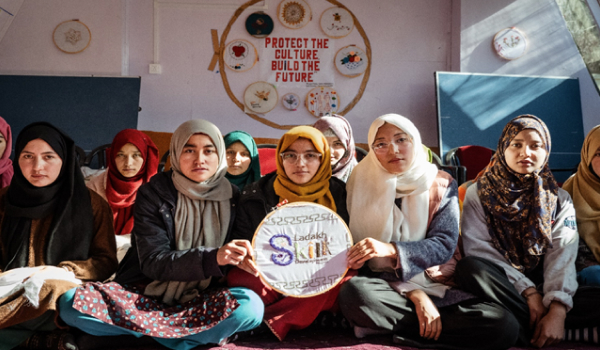Ladakh Youth Empowerment
In the breath-taking landscapes of Ladakh, where resilience meets innovation, a sweeping transformation is underway. A partnership between the Ladakh Skill Development Mission and the Higher Education Department of the Union Territory is shaping not just the education and skilling ecosystem of Ladakh but the aspirations of its youth.
The Colleges in Ladakh are embracing vocational education and skills, and evolving into multi-faceted hubs. The initiative started in 2022 with signing of Memoranda of Understanding between Ladakh Skill Development Mission, University of Ladakh and six Sector Skill Councils on December 10, 2022. The concept is in harmony with the principles outlined in the National Education Policy of 2020 and the Skill India Mission.
Things were very different before Ladakh became a Union territory. Ladakh has a population of around 2.7 lakh spread over 60 thousand square kms. It was a big challenge to skill the people spread over the habitations separated by large distances. The small number of trainees at any location made the skilling initiative commercially unattractive for private Training Partners. During the pre-UT period, the private Training Partners were thus few and most of them targeted the towns of Leh and Kargil. These Training Agencies mostly opted for sectors that required smaller investment in terms of infrastructure and equipment.
When Ladakh became a Union territory on 31st October 2019, the skilling ecosystem consisted of just two Industrial Training Institutes and RSETIs which imparted formal skill training. These were complemented by the sporadic short skilling courses conducted by the Departments of Handloom and Handicraft, Agriculture, Rural Development and Industries besides NIELIT.
To take forward the interventions under the Skill India Mission and Pradhan Mantri Kaushal Vikas Yojana (PMKVY), the Ladakh Skill Development Mission (LSDM) was established in 2021. The Administration of Ladakh gave LSDM the target to have 100% of the workforce in Ladakh trained by the year 2030.
The Ladakh Skill Development Mission first identified challenges faced by the youth in accessing skill training. The first challenge was that youth residing in villages far away from the district HQs were not able to access the skilling interventions. The second challenge was that private Training Partners were finding it difficult to set up their centres in Ladakh due to the cost of establishing centres while the number of prospective trainees were smaller compared to bigger cities and towns in the rest of the country.

To overcome these access issues, Ladakh Skill Development Mission conceived two pronged strategy (i) establishment of LSDM run Skilling Centres in Government Colleges to take skilling down to sub-Divisional level and at the same time skill College students (ii) establishment of a residential Skill Centre which could be offered to private Training Partners to run short term skill courses with hostel facility for those youth from far away villages.
Skill Centres in Government Colleges
There are six Government Degree Colleges (GDC) in Ladakh located in six sub-Divisions and could become excellent skilling centres access points for those wanting to gain skills in the sub-Divisions. At the same time, the students of Colleges could also access the skill courses as envisaged under the National Education Policy 2020.
A Memorandum of Understanding was thus signed between LSDM, University of Ladakh and six Sector Skill Councils (SSCs). The SSCs were selected based on the potential sectors that would offer employment in the UT of Ladakh and taking into account the interest shown by the students in Colleges.
It took close to six months of regular engagement with the Sector Skill Councils to modify the existing modules of various job roles under ‘Short Term Training’, into 3 set of modules of 90 hours duration each, one for each semester, so that the modules could be included into the curricula as per the National Education Policy 2020. The introduction of these modules in the College curricula, consisting of 30 hours of theory and 60 hours of practicals, was thereafter approved by the University of Ladakh. Students completing the course would get 3 credits as per the National Credit Framework. A student could opt for more than one skill course and earn corresponding credits, however, minimum 3 credits from skill course was made mandatory in the first two semesters by the University of Ladakh.
LSDM funded the establishment of skill laboratories in the Colleges while SSCs acted as technical partners. LSDM offered attractive pay packages to get qualified and quality instructors to ensure that the skill courses start well. By September 2023 fifteen Skill Centres were established in four Colleges at Leh, Zanskar, Drass and Kargil.
Skill Courses Offered in Phase- I
High Altitude Trekking Guide program, is now offered at three Colleges in Ladakh, and is equipping students to lead explorers through rugged terrains. Meanwhile, the House Keeping Executive program at Kargil College is instilling the skills needed for impeccable service. These courses, supported by the Tourism & Hospitality Skill Council, THSC, are preparing youth for exciting careers. Students are learning the art of Jam Jelly production and preserving culinary heritage through pickle-making courses offered at Eliezer Joldan Memorial College Leh and Govt College Drass, in collaboration with the Food Processing Skill Council, FICSI, fostering entrepreneurial spirit while creating delectable delights. Graphic Design courses at Government Colleges in Leh, Kargil, and Zanskar are nurturing creative minds. With support from the Media and Entertainment Skill Council, MESC, students are shaping visual narratives and preparing for careers in design, multimedia, and advertising. Kargil's youth are mastering beauty and wellness through courses in Assistant Beauty Therapy, Makeup Artistry, and Yoga instruction. These programs, supported by the Beauty & Wellness Sector Skill Council, B&WSSC, can open doors for the youth to the beauty and film industry and also help them guide others on the path to holistic health. In Kargil, Zanskar, and Sankoo, the art of traditional hand embroidery is thriving. These programs celebrate culture and craftsmanship with support from the Handicrafts and Carpet Sector Skill Council, HCSSC. At EJM College Leh, the Mushroom Grower course is sowing the seeds of agribusiness. Students are aiming to become skilled cultivators and contribute to sustainable farming practices in Ladakh, guided by the Agriculture Skill Council of India, ASCI.

Courses for Phase II
LSDM is planning more MoUs in the ITeS and Green Jobs sector, which offer immense potential. More courses shall be introduced in coming years based on the Industry demand and interest of the students.
To assess the demand of the Industry and aspirations of youth, LSDM has taken up a comprehensive Skill Gap cum Livelihood study. The study, spanning over 6 months, is covering each block of the two districts of Ladakh. The study will help the Administration assess the available skills, the current skilled workforce demands of the industry and projected demand for skills for the next five years, besides understanding the career aspirations of the youth.
Residential Skill Centre
The second intervention was setting up of a residential skilling centre in Leh. Ladakh Skill Development Mission took up the project for construction of the Skill Centre in the campus of Polytechnic College Leh. The 3 floor Academic Block comprises two Halls for Laboratories/Workshop and four Lecture Halls for running upto parallel 4 courses. The building is designed to meet the requirements under PMKVY of Bio-metric attendance, CCTVs etc. The project is designed as a winter friendly and solar passive structure in keeping with the extreme winters in Ladakh. The Hostel block is designed with a capacity to house 52 trainees and two Vocational Trainers/Instructors. The project is expected to be completed by 2025-26.
Once the Skill Centre is ready it shall be offered to private Training Partners to impart skill courses under Pradhan Mantri Kaushal Vikas Yojana (PMKVY)
Employability Skills
Ladakh Skill Development Mission is also collaborating with Wadhwani Foundation to ensure that the students are equipped with not just academic and technical knowledge but also essential employability skills, making them valuable assets to the workforce. The pilot saw training of 15 College Teachers by the Wadhwani Foundation group on the platform developed by the Foundation to skill final year students with soft skills essential for employability. Based on the outcome of the pilot, the programme shall be scaled up to cover youth outside the education system besides the college students.
At the same time efforts have been taken for creating apprenticeship opportunities, bridging the gap between classroom learning and real-world application as mandated under the National Apprenticeship Promotion Scheme of Government of India. Sustained multimedia campaign is persuading government and private establishments to create apprenticeship opportunities. The Ladakh Education Fair played a pivotal role in creating awareness about skill courses and apprenticeships.
Ladakh Education Fair & Skill Gap cum Livelihood Study
Launched in 2022, Ladakh Education Fair is now an annual feature organised in all Colleges in September. The Fair lays a lot of emphasis on making youth aware of various Skill Courses and need for upskilling besides focussing on career guidance, apprenticeship opportunities and subject choice for students of Higher Secondary schools.
Convergence of education and skill development is the need of the hour, and in Ladakh, strategic interventions have already been taken up in this direction. Guided by the Skill India Mission and National Education Policy, this journey from aspirations to skills is a commitment of Ladakh Administration to empower its youth.


